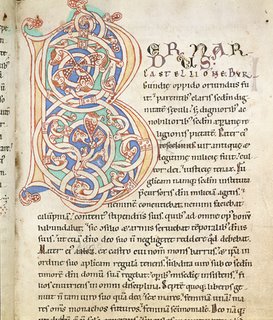
William of Saint-Thierry (ca. 1085-1148) was a French monk, theologian and "mystic" who had been a close friend of Bernard of Clairvaux. He was an early critic of the rationalistic theology later known as "Scholasticism," and opposed the rationalistic theology of Peter Abelard before Bernard of Clairvaux did so -- and in fact encouraged Bernard to oppose him.
He was not, however, by any means against asking questions or using one's intellect. He was not an irrationalist, neither was he antirational. What he opposed was questioning that seemed to him to be unfaithful and wholly rooted in cynicism rather than in faith and faithful pursuit of truth. Cynical questioning is rooted in pride rather than in discipleship.
In his work The Mirror of Charity, William wrote:
When more obscure mysteries are presented to your timid nature by your faith, Christian soul, take courage and say, "How are these to come about?", not in a controversial spirit but with the love of a disciple.
Let your questioning be your prayer, your love, your piety, your humble desire; not seeking to plumb the depths of God's majesty, but looking for salvation in the healing acts of God who saves us. And the Angel of great counsel will reply to you: "When the Counsellor comes, he whom I shall send from the Father, he will bring to mind all things, and teach you all truth." For no one "knows a man's thoughts except the spirit of the man which is in him; so also no one comprehends the thoughts of God except the Spirit of God."
Hasten then to be a sharer in the Holy Spirit. He is present when he is called upon; nor could he be called upon if he were not present. When, on being called upon, he comes, it is with the abundance of the blessings of God. He is the flowing of the river which gives joy to God's city.
And if, when he comes, he finds you humble and still and respecting the words of God, he will rest upon you; and he will reveal to you what God the Father withdraws from the wise and prudent of this world; and those things will begin to dawn upon you which Wisdom could say to the disciples when on this earth, but which they were unable to bear, until the Spirit of truth came who was to teach them all truth.
In the diligent seeking after or learning of these matters it would be vain to expect from any human teacher what cannot be sought or learnt from the lips of Truth himself. For as that Truth says, "God is spirit," and as it is necessary for those who adore him to do so in spirit and in truth, so for those who wish to learn of him or know him it is only in the Holy Spirit that the understanding of the faith and the perception of the pure and unadorned truth ought to be sought.
For in the darknesses and ignorance of this life, he is the light which enlightens the lowly of spirit; he is the love which draws us; he is the sweetening presence; he the human being's approach to God; he the love of the loving; he is devotion; he is piety.
He reveals to the faithful the justice of God which starts from faith and ends in faith; when for grace he gives grace, and for the faith which is by hearing the faith which gives light.
No comments:
Post a Comment